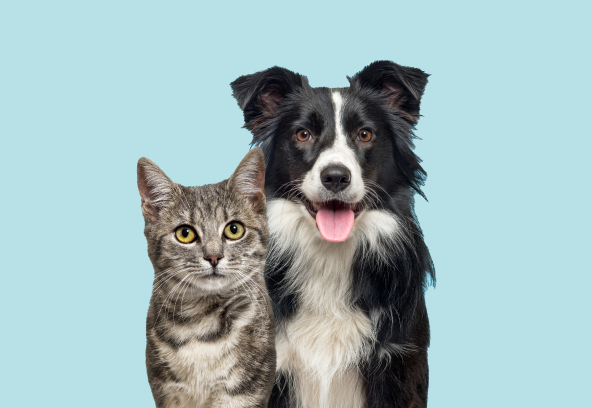
Fit Furry Friends: Saving Costs & Calories

Keeping your pet at a healthy weight is key for their well-being and can save you money on vet bills. In this post, we'll discuss managing their weight, safe weight loss, and the financial benefits of a fit pet.
The weight of your pet plays a crucial role in its health, longevity, and overall quality of life. Overweight and obese pets face a higher risk of various health issues, leading to expensive vet bills and, more importantly, impacting their happiness and comfort.
This post explores strategies for maintaining a healthy weight range for cats and dogs, safe weight loss methods, and the direct link between a pet's weight, potential illnesses, and the financial implications of those health issues.
The importance of a healthy weight
A pet's healthy weight depends on factors like breed, age, and size. Yet, all pets benefit from maintaining a weight that supports their bodily functions without adding stress on their organs and joints. Overweight pets are more prone to diabetes, heart disease, arthritis, and an increased risk of cancer. Excess weight can also worsen conditions such as hip dysplasia in dogs or respiratory issues in brachycephalic breeds (like Bulldogs or Persian cats).
Early intervention and prevention
Preventing obesity in pets is much easier than treating it once it has developed. Early intervention is key to ensuring your pet maintains a healthy weight throughout its life.
Regular vet check-ups are essential for monitoring your pet's weight and overall health. During these visits, your vet can provide guidance on proper nutrition and exercise tailored to your pet's specific needs. Starting these habits early, especially in puppies and kittens, can set the foundation for a lifetime of good health.
Identifying an overweight pet
Recognising if your pet is overweight is crucial in managing its weight. A visit to the vet is recommended, as they can provide an accurate assessment using the Body Condition Score (BCS). This score evaluates the amount of visible and palpable fat and the pet's overall shape and size. Generally, pets should have a discernible waist, and you should be able to feel their ribs without a thick layer of fat.
Strategies for weight management
- Proper diet: Feed your pet a balanced diet suitable for their life stage, size, and activity level. Consult your vet to determine the best food type and portion sizes. Treats should not exceed 10% of a pet's daily caloric intake.
- Regular exercise: Physical activity is essential for keeping your pet at a healthy weight. For dogs, this might mean daily walks or play sessions, while cats may need interactive toys or supervised outdoor time.
- Routine check-ups: Regular vet check-ups can help catch and address weight issues early. Your vet can provide tailored diet and exercise advice based on your pet's health status and needs.
Safely achieving weight loss
If your pet needs to lose weight, it's important to do so gradually and under vet supervision. Rapid weight loss can be dangerous, particularly for cats. A safe weight loss plan typically involves dietary changes and increased exercise. Your vet may recommend a weight loss diet that is lower in calories but still nutritionally complete, alongside a structured exercise regimen.
The link between weight and illness
The connection between a pet's weight and its risk of illness is undeniable. Overweight pets are more likely to suffer from joint problems, diabetes, and liver disease, all of which can result in substantial veterinary expenses. For example, managing diabetes in pets requires regular vet visits, medication, and possibly insulin injections, which can be costly over time. Similarly, treating joint issues might involve pain medications, physical therapy, or surgery.
Financial Implications of obese pets
The financial implications of obesity in pets can be significant. Overweight pets are at a higher risk of developing chronic conditions that require ongoing medical treatment. Here are some examples:
- Diabetes: Managing diabetes in pets often involves regular blood sugar monitoring, insulin injections, and special dietary requirements. The cost of insulin, syringes, and frequent vet visits for monitoring can add up quickly.
- Joint Problems: Overweight pets are more prone to developing joint issues like arthritis or hip dysplasia. Treatment may include pain relief medications, supplements for joint health, physical therapy, and in some cases, surgery. These treatments can be costly and may be required for the remainder of the pet's life.
- Heart Disease: Obesity can lead to heart problems, requiring medications, special diets, and regular check-ups with a vet.
The path to a healthier, happier pet
Ensuring your pet maintains a healthy weight is an integral part of their overall well-being and happiness. Early intervention, alongside a balanced diet and consistent exercise, lays the foundation for a life free from obesity-related health issues. Regular vet check-ups serve as your best tool in this preventative approach, allowing for early detection and management of potential weight concerns.
The journey towards optimal pet health is a shared adventure, one that strengthens the bond between you and your furry companion, while also safeguarding their vitality and zest for life. Remember, a leaner pet isn't just a healthier pet; it's a happier, more vibrant member of your family, ready to enjoy every moment by your side.
Get ready to shield your pet against the unexpected?
Discover how our comprehensive pet insurance options can be your financial lifeline in times of need. Explore the possibilities today – contact us or see the details of our plans.

